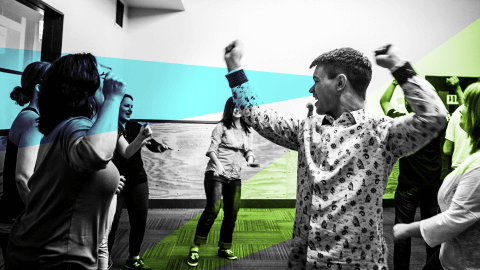Families with kids on the Autism Spectrum are some of the most inspiring ones that I know. They’re constantly discovering ways to teach and learn, and more often than not, the methods are creative and innovative.
I had recently learned about how improv can help teens living with autism at The Second City. The 8-week workshop is designed to introduce and reinforce the fundamental skills of improv to teens on the spectrum. The skills help students gain confidence while practicing social skills in a safe environment. So, why improv? Many of the exercises improve focus on the importance of active listening, supporting other people’s ideas and working together. According to the workshop description, this program also removes the performance aspect of improv and has left the fun in. Currently, the program is taught by Cassie Moes, an experienced Improviser with a degree in Education and a graduate of the Second City Conservatory Program. Cassie has also taught Special Needs for two years in BC, so the combination of her skills is ideal.
Kevin Frank, Artistic Director at Second City Training Centre & Education in Toronto tells us that they’ve been running Youth & Teen programming for 20 years and their summer camps have always been popular with kids on the spectrum. “Parents saw it as a place where their son/daughter can enjoy a new experience in a place where ‘accepting’ is the number one lesson taught,” says Frank. “We brought in Subject Matter Experts to help us modify our curriculum to better host all students. It became a natural progression for us to add these classes to our year-round terms.”
Recently, they started offering “Improv for Teens on the Spectrum,” specifically. Classes were capped at 10 students and they added an associate instructor to the program. As a result of positive feedback so far, they’ve added a second level and hope to run two classes in the upcoming term.
Frank tells us that learning to improvise will help any teen, on the spectrum or not, feel more confident when they need to speak without using a script. “We create a safe and nurturing space where students can practice effective communication skills until they become second nature,” said Frank. “Good Improvisers are open to incorporating other people’s ideas and they are not afraid of taking risks. Good Improvisers are very aware of the impact body language has on communication. Good Improvisers never experience a ‘creative block’.”
I wondered, what are some of the common reactions from the kids when they begin the course? “New Improvisers often think they need to be funny. Nothing could be farther from the truth. If you concentrate on supporting your partner’s idea and offer a truthful and honest reaction, the funny will take care of itself,” said Frank (P.S. I noted that for myself…I think I may need to take one of their adult improv classes soon!)
Autism is a two-way street. Those living on the spectrum are constantly learning, but they are also teaching the rest of us as well. So many of these tips and lessons are applicable not just for teens, but to many of us.
“Any performer will tell you that teaching is a constant reminder that if you focus on the fundamentals then everything will work out. I love to watch new Improvisers find magical moments of creativity,” said Frank.
The next term begins on September 10, but for more information visit www.secondcity.com

Leave a Reply